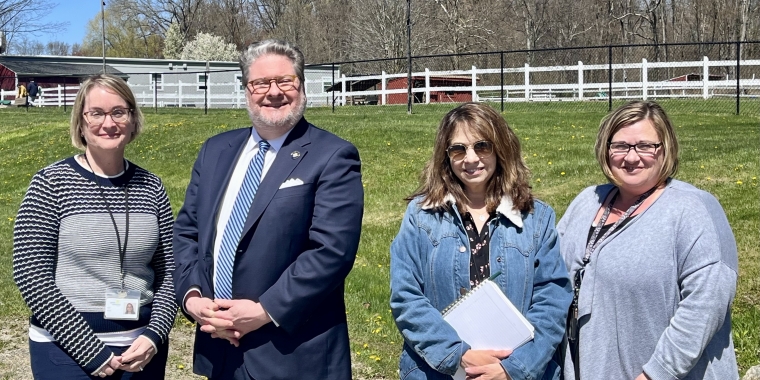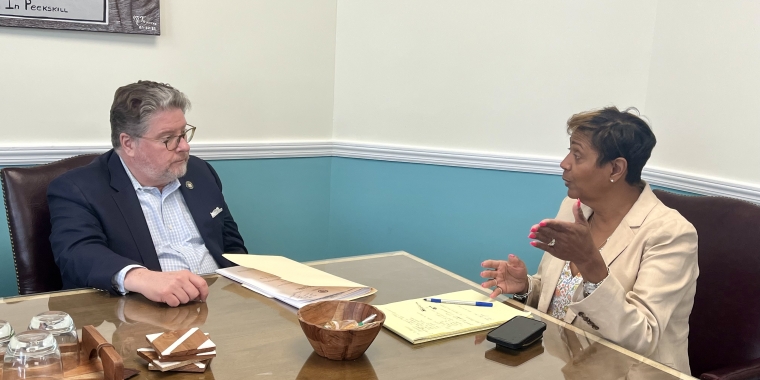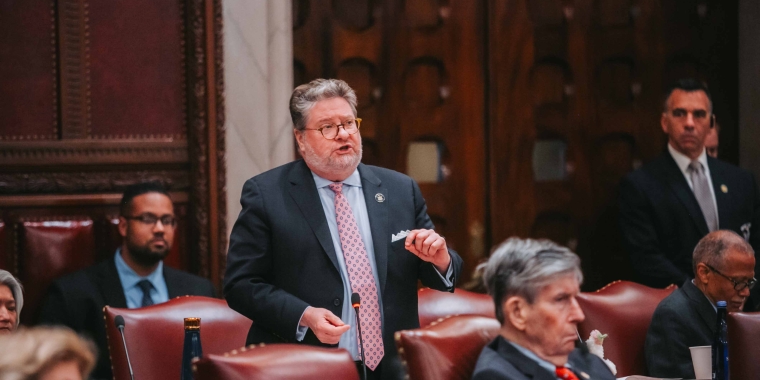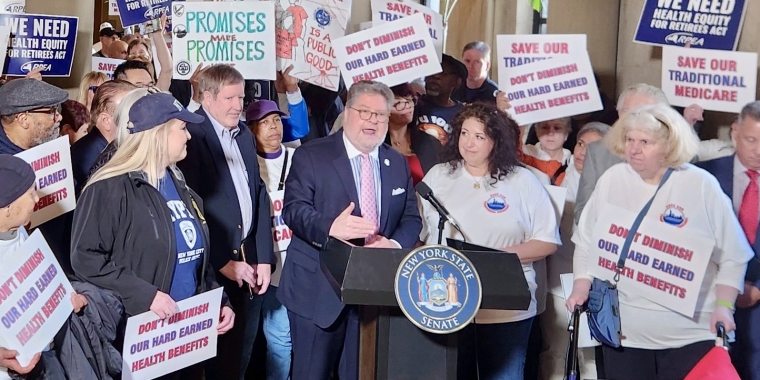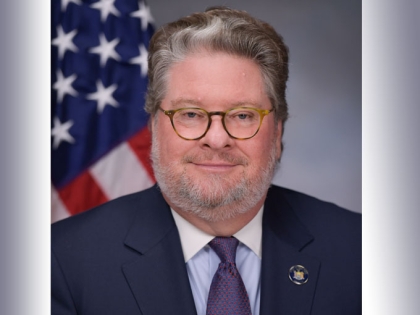
Harckham, Local Elected Officials Announce Support for Packaging Reduction and Recycling Infrastructure Bill
February 23, 2023
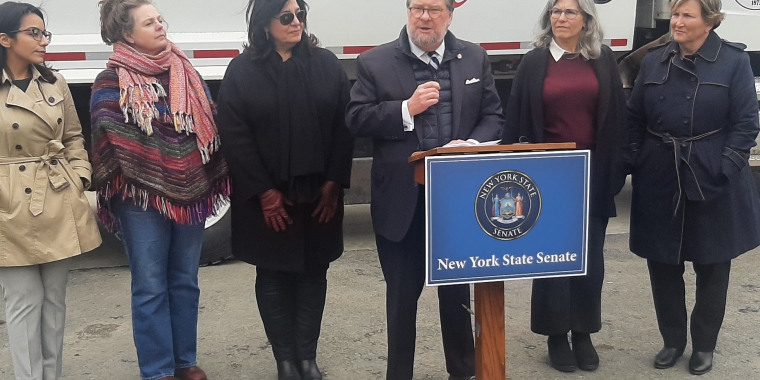
Mount Kisco, NY - New York State Senator Pete Harckham was joined today by Mount Kisco Mayor Gina Picinich and Westchester Legislators Erika Pierce and Nancy Barr in announcing support for the Packaging Reduction and Recycling Infrastructure Act. The announcement took place at a press conference held at the Mount Kisco Public Works Department’s Village Garage.
The new bill (S.4246), introduced by Harckham earlier this month, will require companies with a net annual income of over $1 million to reduce consumer packaging, improve recycling efforts of their product packaging and help update recycling infrastructure. Additionally, companies will be expected to create and / or maintain reusable and refill infrastructure, support municipal recycling programs financially and reduce the toxins in their packaging.
“We need to immediately address one of the dire problems of our age: the tremendous amount of waste, much of it recyclable, that we create each day—and which costs taxpayers and municipalities hundreds of millions of dollars in wasted carting and recycling costs,” said Harckham. “The system is broken. The only way we can begin to mitigate this growing issue of waste pollution and its threat to our natural resources is for the initial producers of this waste to be fully involved with the end-of-life solutions. Right now, municipalities and taxpayers are footing practically all of the enormous costs of product packaging pollution and recycling, and that’s neither fair nor viable in the long run.”
To watch a video of the press conference, click here.
The average New Yorker creates nearly 5 pounds of trash every day, which means our state produces approximately 15 million tons of waste each year, 14 million tons of it by New York City residents and businesses alone. This waste primarily goes to landfills and incinerators, but can often end up in our water, natural habitats and municipal spaces.
The recycling rate for the entire United States was estimated to be between 5-6% in 2021. While New Yorkers understand the importance of reducing their waste, reusing what we can and recycling, our current system is not meeting our environmental demands. Local governments continue to struggle with recycling costs and infrastructure, evidenced through increased taxes or significantly limited materials that can be collected.
“Collecting and disposing of recycled materials is a major expense for local governments and taxpayers,” said Picinich. “Thank you to Senator Harckham for recognizing our challenge and introducing legislation that will require large companies to reduce packaging and contribute to costs for disposal. Reducing waste reduces costs and is better for our environment.”
The bill’s timeline calls for producers to reduce their packaging by 10% of weight within three years, 20% by five years, 30% by eight years, 40% by 10 years and 50% by 12 years.
Moreover, there will be specific standards for post-consumer recycled material for packaging. Glass should be at least 35% post-consumer recycled content, paper carry out bags should be 40% and plastic bags should be 20%.
Harckham’s bill will make it mandatory for the eligible producers of consumer packaging and recyclable waste to join a Producer’s Responsibility Organization (PRO) within a year of the bill’s enactment and create a plan within 18 months for submission to an advisory council to gauge compliance with the new packaging and recycling rules. Once approved, the producers have six months to implement their plan.
The New York State Department of Environmental Conservation will determine the effectiveness of each producer’s education and outreach efforts regarding their packaging plan. If a plan is not approved within two years, the producer may be subject to penalties for noncompliance. To this end, the bill will establish an Office of the Inspector General to gauge compliance. Producers in violation of part of the new legislation will be fined $100,000 a day until requirements have been implemented. Each PRO will submit an annual report on their packaging and recycling to the DEC.
A fee system will be instituted and approved by the DEC for each PRO to calculate costs to provide curbside collection, process materials for recycling and to deal with packaging that cannot be processed or recycled. The fees will cover reuse and refilling determinations and judging the commodity value of the packaging material.
In many respects, Harckham’s bill mirrors the details of the Article 7 legislation Governor Kathy Hochul included in her FY2024 Executive Budget. While there are many differences, the biggest one is that Harckham’s bill also focuses on eliminating toxic chemicals and compounds in packaging material. His bill, once enacted, will give producers two years to remove certain toxic substances—PFAs, heavy metals, formaldehyde, halogenated flame retardants and more—from their packaging. Three years after the bill’s enactment, the list will grow by another 10 or more substances.
“Westchester has a robust recycling system for those municipalities who have opted in, but what has become clear is that the systems that are in place for disposing of waste cannot keep up with the amount of waste that is produced,” said Barr. “And the systems we have, such as landfills and incinerators, create their own problems by polluting our water and air. Recycling is useful, but much more limited than we were once led to believe.”
Added Barr, the vice chair of the Westchester County Board of Legislators and chair of the board’s Environment, Energy and Climate Committee, “The best way to reduce waste is to put the cost and responsibility of disposing it on the companies who create it, rather than on the taxpayers who have little control over it. When the cost comes out of the producers’ pockets, instead of ours, we will finally see a change.”
Pierce, chair of the Westchester Legislators Public Works and Transportation Committee, said, “In 2021, Westchester had over a million tons of recyclable materials, some of which were toxic. Residents here paid to dispose of every single pound, in dollars and in greenhouse gas emissions. We need our producers to minimize packaging, and then we need them to take responsibility for their appropriate disposal when they cannot. If we are going to be serious about reducing waste, we need to be serious about supporting Senator Harckham’s legislation.”
